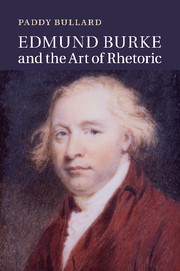Book contents
- Frontmatter
- Contents
- Acknowledgements
- Abbreviations
- Introduction: Burke, rhetoric and ethics
- 1 The ethical turn in early modern rhetoric, 1600–1760
- 2 Rhetoric in Ireland, 1693–1765
- 3 The Epicurean aesthetics of the Philosophical Enquiry
- 4 Episodes in the evolution of Burke's eloquence
- 5 Reflections on the Revolution in France and the rhetoric of character
- 6 Burke, Rousseau and the purchase of eloquence
- Conclusion
- Notes
- Bibliography
- Index
6 - Burke, Rousseau and the purchase of eloquence
Published online by Cambridge University Press: 01 June 2011
- Frontmatter
- Contents
- Acknowledgements
- Abbreviations
- Introduction: Burke, rhetoric and ethics
- 1 The ethical turn in early modern rhetoric, 1600–1760
- 2 Rhetoric in Ireland, 1693–1765
- 3 The Epicurean aesthetics of the Philosophical Enquiry
- 4 Episodes in the evolution of Burke's eloquence
- 5 Reflections on the Revolution in France and the rhetoric of character
- 6 Burke, Rousseau and the purchase of eloquence
- Conclusion
- Notes
- Bibliography
- Index
Summary
By the middle of February 1790, Burke had written enough of the Reflections for the work in progress to be worth circulating among his friends. Composition seems to have been interrupted during spring and early summer, however, by parliamentary business. Burke's return to serious work on his manuscript, probably after the dissolution of Parliament on 11 June 1790, is duly recorded on page 241 (signature R) of the first edition: ‘This letter is grown to a great length’, he admits, ‘though it is indeed short with regard to the infinite extent of the subject. Various avocations have from time to time called my mind from the subject.’ These lines begin a notably distinct section of the Reflections, a two-thousand-word recapitulation of the themes covered in Burke's earlier drafts. This recapitulation will be the focus of my final chapter. Whereas the first two thirds of the Reflections are concerned with the political morality of the National Assembly, with the ‘arrogance of their pretensions’ and with the presumption of their British admirers, the final third, writes Burke, will be concerned more specifically with their measures: ‘They must take it for granted that we attend much to their reason’, Burke warns, ‘but not at all to their authority’ [242]. In rhetorical terms, we might say that the first two thirds criticize the varieties of revolutionary character, while the final section of the Reflections sets out to deal with their proposals, and, more generally, with the capacity of the National Assembly for good deliberation and legislative pragmatism.
- Type
- Chapter
- Information
- Edmund Burke and the Art of Rhetoric , pp. 174 - 193Publisher: Cambridge University PressPrint publication year: 2011



